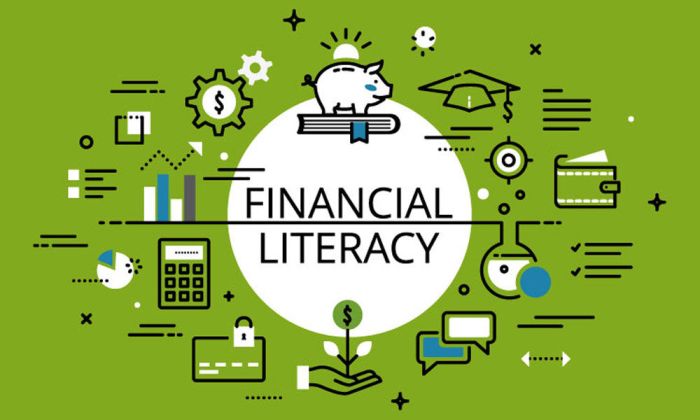Yo, diving into the world of financial literacy is like unlocking the keys to your future. It’s all about making smart money moves and securing that bag, you feel me? In this groove, we’ll break down the importance, key concepts, strategies, and challenges of financial literacy. So, buckle up and let’s ride this wave of financial wisdom!
Now, let’s break it down and get real about what financial literacy is all about.
Importance of Financial Literacy

Financial literacy is crucial for individuals as it equips them with the knowledge and skills needed to make informed financial decisions. Without a solid understanding of financial concepts, individuals may struggle to manage their money effectively, leading to financial stress and insecurity.
Positive Impact of Financial Literacy
- Individuals with financial literacy are better equipped to create and stick to a budget, allowing them to save more effectively for their future goals.
- Understanding investment options and strategies can help individuals grow their wealth over time, leading to financial stability and independence.
- Financially literate individuals are more likely to make informed decisions when it comes to borrowing money, avoiding high-interest debt and improving their credit score.
Consequences of Lacking Financial Literacy
- Individuals who lack financial literacy may fall prey to predatory lending practices, leading to a cycle of debt and financial hardship.
- Without a clear understanding of financial concepts like interest rates and compounding, individuals may miss out on opportunities to grow their wealth.
- Poor financial management due to lack of literacy can result in missed bill payments, late fees, and a negative impact on credit scores, making it harder to access credit in the future.
Key Concepts in Financial Literacy
Financial literacy encompasses the knowledge and skills required to make informed and effective financial decisions. It involves understanding various financial concepts, products, and tools to manage personal finances effectively.
Essential Financial Terms
- Income: The money you earn from sources such as salary, wages, investments, or business profits.
- Expenses: The money you spend on goods and services, including bills, groceries, rent, and entertainment.
- Debt: Money borrowed from a lender that must be repaid, usually with interest.
- Interest: The cost of borrowing money or the return on invested funds, expressed as a percentage.
Principles of Budgeting, Saving, and Investing
Understanding and applying these fundamental principles are crucial for achieving financial stability and growth.
- Budgeting: Creating a plan for how you will allocate your income towards expenses, savings, and investments.
- Saving: Setting aside a portion of your income for future needs or emergencies, typically in a savings account or other low-risk financial instruments.
- Investing: Putting money into assets such as stocks, bonds, or real estate with the expectation of generating returns or growth over time.
Strategies to Improve Financial Literacy
Financial literacy is a crucial skill that can empower individuals to make informed financial decisions. Here are some practical tips to enhance financial literacy:
Develop a Budget and Track Expenses
- Create a monthly budget outlining your income and expenses.
- Track your expenses to identify areas where you can cut back.
- Use budgeting apps or tools to help you stay organized.
Take Advantage of Financial Education Programs
- Attend financial literacy workshops or seminars in your community.
- Enroll in online courses or certifications related to personal finance.
- Seek guidance from financial advisors or experts to improve your financial knowledge.
Build Emergency Savings and Invest Wisely
- Set aside a portion of your income for emergency savings to cover unexpected expenses.
- Educate yourself on different investment options and start investing early for long-term financial growth.
- Consult with a financial planner to create a diversified investment portfolio based on your financial goals.
Stay Informed and Seek Continuous Learning
- Read financial books, articles, and podcasts to stay updated on financial trends and strategies.
- Attend webinars or conferences on financial literacy to expand your knowledge base.
- Join financial forums or discussion groups to learn from others and share your experiences.
Challenges in Promoting Financial Literacy
Financial literacy faces several challenges that hinder its promotion, impacting individuals and communities alike. These barriers can be attributed to socio-economic factors and the evolving landscape of technology.
Barriers to Promoting Financial Literacy
- Lack of Access to Quality Education: Many individuals do not receive adequate financial education in schools or communities, leading to a lack of basic knowledge.
- Complex Financial Products: The increasing complexity of financial products makes it challenging for individuals to understand and make informed decisions.
- Language and Literacy Barriers: Limited proficiency in financial terminology and literacy skills can hinder individuals from grasping important financial concepts.
- Cultural Taboos: Cultural beliefs and societal norms around money management can create barriers to promoting financial literacy.
Impact of Socio-Economic Factors on Financial Literacy Levels
- Income Disparities: Socio-economic status can influence access to resources and educational opportunities, impacting financial literacy levels.
- Generational Wealth: Inherited financial knowledge and practices within families can either support or hinder the development of financial literacy.
- Employment Stability: Individuals with unstable employment may prioritize immediate financial needs over long-term planning, affecting financial literacy levels.
Role of Technology in Addressing Challenges
- Online Resources and Tools: Technology provides access to a wide range of online resources and tools that can enhance financial literacy through interactive learning platforms.
- Mobile Apps: Financial literacy apps offer personalized solutions and real-time tracking of expenses, promoting better financial management practices.
- E-Learning Platforms: Virtual classrooms and digital courses make financial education more accessible to a wider audience, overcoming traditional barriers.
- Robo-Advisors: Automated investment platforms can guide individuals in making informed investment decisions, improving financial literacy levels.
